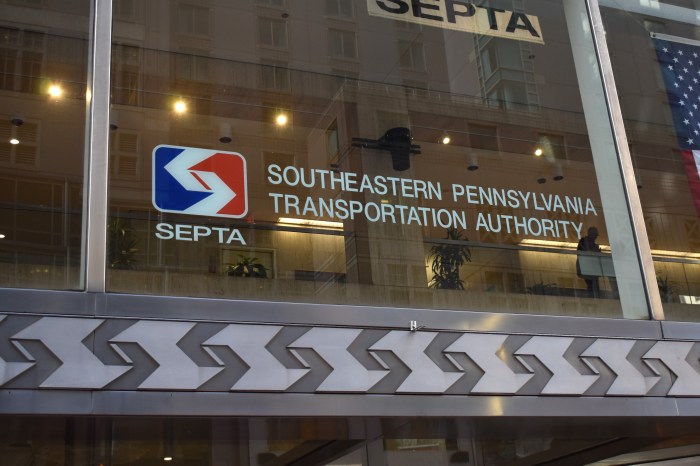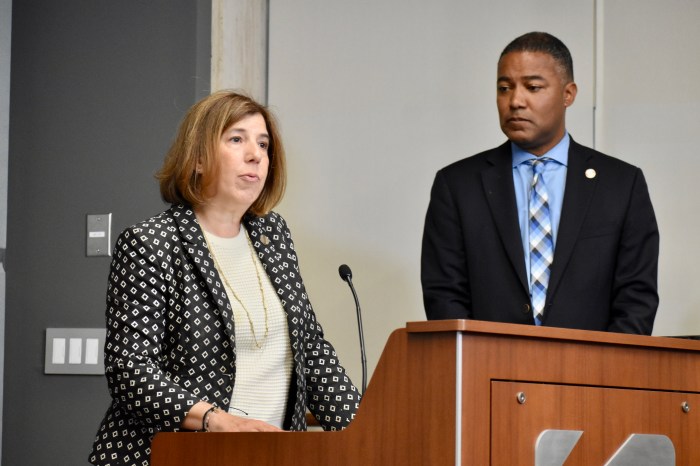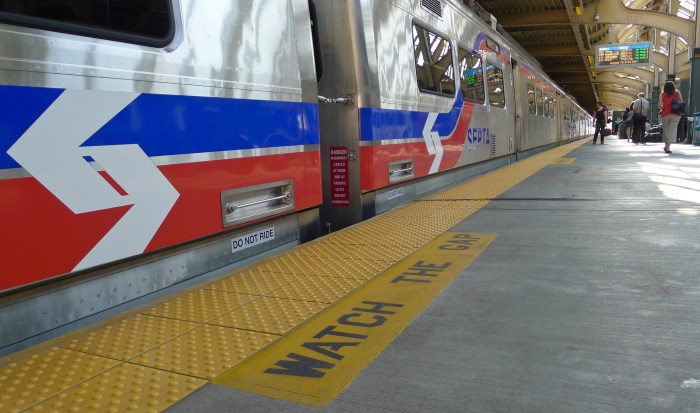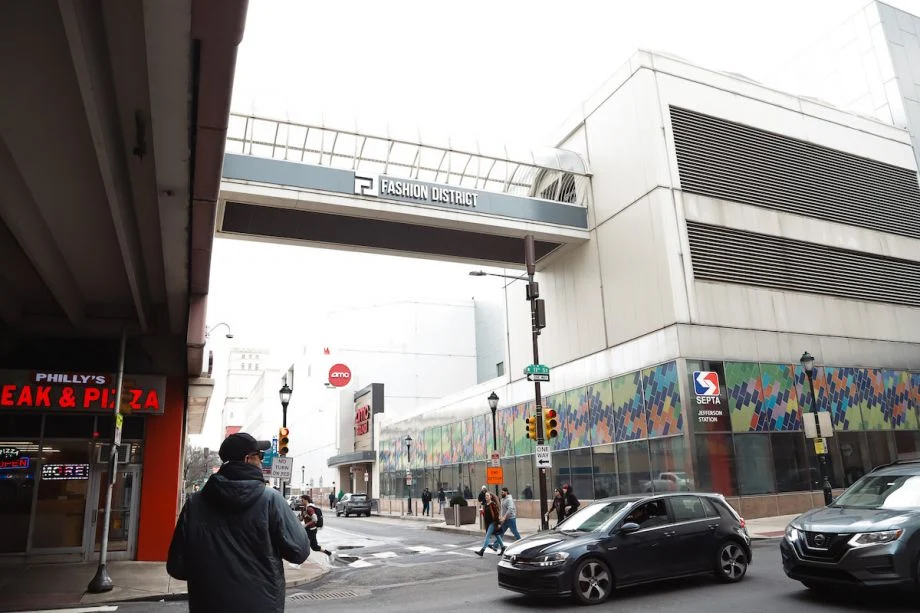This article was originally published by Next City.
After years of proposals and community protests, Philadelphia might be getting a brand new downtown arena. Among the largest community concerns over the proposed 76ers basketball arena is the indirect displacement of residents and businesses in Chinatown, located just a block away — a conclusion supported by a report released by the city. But another major concern is the expected increase in game-day traffic.
According to a city-commissioned traffic analysis of the development proposal, to avoid catastrophic congestion, 40% of fans must take transit to the stadium. One recommended solution: include a transit pass with every ticket.
It’s called transit validation: For every ticket sold to an event, a transit pass is included free of charge. The concept is a no-brainer for cities and transit agencies, but also for people who drive to games, notes Donald Shoup, professor of urban planning at UCLA.
“If you were going to drive to the game, wouldn’t you be happy if you thought that everybody else was taking the bus? So who’s losing? Nobody’s losing,” he says.
The concept is so obvious, that other countries like New Zealand and Germany have been doing it for decades, he points out.
“It would mean a more diverse group of people can go to the games, people who don’t have a car, people who think that parking is very expensive.”
But as Philadelphia and the 76ers claim that the goal of 40% of fans taking transit is feasible, SEPTA is facing a fiscal cliff that will lead to higher fares and service cuts, a doom spiral that could spell the languishing and death of the system. Right now, the agency has a $240 million deficit and state leaders are still figuring out how to avoid drastic service cuts.
“There seems to be a lack of recognition of the cascading effects this will have on the economy, mobility, competitiveness of the entire Commonwealth as a whole,” says Connor Descheemaker, coalition manager at Transit Forward Philly.

The new arena — which has been endorsed by Mayor Cherelle Parker but will first require City Council to approve a legislative package that includes zoning changes — is no exception.
The 76ers have said they plan to offer transit passes for season ticket holders. But despite the recommendation from the report that the arena bundle transit fare with every ticket sold, so far the $50 million proposed community benefits agreement only includes $3 million for transit subsidies over 30 years.
That amount only covers 600,000 round trip fares on SEPTA or about 32 games, assuming everyone took transit (not including regional rail).
It happened in Seattle. Why not Philly?
Free transit for event ticket holders is nothing new, with the Golden State Warriors in San Francisco and the Seattle Kraken both offering this benefit for fans.
Billing itself as the “most sustainable” arena in the world, the Climate Pledge Arena and home of the Seattle Kraken offers free transit passes to every ticket holder for every event. This was by design, says Rob Johnson, senior VP for sustainability and transportation.
In addition to reducing congestion in a dense urban neighborhood and reducing greenhouse gas emissions, the team wanted to improve the fan experience — especially the experience of getting stuck in post-event traffic.
“The next day, you’re not talking with your friends about how awesome the show was,” says Johnson. “You’re talking with your friends about how terrible it was to get out of the garage or how difficult the transit ride home was.”
In addition to offering free transit passes, the Kraken invested $40 million in new bike lanes, sidewalks and transit stops in the neighborhood, as well as $7 million to make it easier for fans to take monorail to the stadium.

The program has been a massive success with 25% of Kraken fans and 20% of ticket holders overall taking transit to the stadium, compared to a maximum of 10% before.
“Our transit system is going to expand dramatically over the next couple of years,” says Johnson. “So that number is only going to go up as we see more and more light rail miles come online.”
It takes coordination with multiple transit agencies to set up a transit validation program. For the Climate Pledge Arena program, the Kraken created their own proprietary app that integrates with Seattle’s Transit GO app.
The Kraken pays for each ticket that a fan uses to get to the stadium, representing six forms of transit across four agencies. In order for the program to work, the team needed all four transit agencies to get on board. Luckily, agencies were hungry for ways to get more people on public transportation.
“We were one of the last places in the country to still have a lot of people working from home,” says Johnson. “So we had a lot of support from transit agencies as a way for our fans to help get juiced up ridership on all of those different forms of public transit.”

Johnson declined to give the exact number but confirms that the Kraken spends over $1 million per year on transit passes for fans.
“It’s good for the transit agency because it’s more money, paying riders,” says Shoup. “What would be better than more paying riders for a transit agency? It’s good for the game-goers, because if they want to take transit, it’s free.”
Despite the benefits, bundling transit fare with tickets still isn’t the default for entertainment venues in the U.S. — Johnson notes that overlap between “transit nerds” and people with decision-making power in the sports industry isn’t the norm. He recommends seeking a corporate sponsor to pay for the costs of a similar program, something that SEPTA is exploring, according to the Philadelphia Business Journal.
In Philadelphia, no champion for transit validation has emerged. Next City reached out to the city of Philadelphia for an interview but received no response. A spokesperson for the 76ers declined an interview and instead pointed to the website for the new arena.
Meanwhile, transit advocates are continuing to sound the alarm about the need for state leaders to take decisive action and fund public transportation. There’s a symbiotic relationship not just between transit and basketball, but between transit and the economic future of Pennsylvania.
Descheemaker notes that Transit Forward Philly has no position on the new arena, which is being opposed by neighbors who say that they don’t trust the development process.
“We’re in a position where the need is so immense that anyone talking about a few million dollars here or there is, frankly, almost laughable to think about that as being something that will or will not help SEPTA.”
This story was produced through the Equitable Cities Fellowship for Social Impact Design, which is made possible with funding from the National Endowment for the Arts.
Metro Philadelphia is one of more than 25 news organizations powering the Philadelphia Journalism Collaborative. We do solutions reporting on things that affect daily life in our city where the problem and symptoms are obvious, but what’s driving them isn’t. Follow us at @PHLJournoCollab.
























